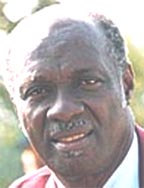Reverend Wes Hall said yesterday he was “astonished and saddened” by the level of personal invective directed at him by the West Indies Cricket Board (WICB) in a statement on Sunday, especially since it was based on false information.

“In more than 50 years involved in West Indies cricket, I have never known the WICB deliver such a fierce tirade against anyone,” Hall, the legendary fast bowler of the 1960s, former Barbados government minister and one-time WICB president, said.
The WICB charged that Hall told a press conference in Antigua last week that the Stanford 20/20 board, of which he is a member, “was frustrated over the use of Stanford funding by the WICB”.
It termed the alleged comments “wreckless, baseless and grossly inaccurate” and regretted that its “former chairman was associated with such a gross misrepresentation of the facts which are that the Stanford Group has been woefully short on its promise to facilitate cricket development in the Caribbean”.
Hall denied ever mentioning the WICB in connection with Stanford funding, a position he said was verified by a reporter’s tape recording of the proceedings.
“Stanford gave money as part of its development plan directly to the 20 individual territorial boards that participated in the regional 20/20 tournament, some of which are not even members of the WICB, and not to the WICB,” he explained.
He presumed that what he termed the “WICB’s malicious attack” was based on a report in the Jamaica Daily Gleaner that mistakenly made the link.
The Gleaner reporter inserted WICB in brackets in a direct quote from Hall that “the Stanford board was a bit frustrated because we give them (WICB) the money and they put it on fixed deposit and spent in on non-cricketing things.”
“The ‘them’ was a reference to the relevant territorial boards, not to the WICB,” he said. “The only money that the WICB has received from Stanford is US$2 million annual licence fee for sanctioning the regional Stanford 20/20. There is also the proposed US$3.5 million annually for the Stanford Super Series over the next three years.”
Hall said that, at the press conference, he lauded WICB president Julian Hunte’s role in facilitating the Super Series.
The WICB statement expressed “great shock and amazement” at Hall’s references “to fixed deposits and utilization of funds provided by the Stanford Group in non-cricketing matters”.
“Everyone knows that one board initially put the Stanford money on a fixed deposit account and spent only $37 for a case of Gatorade and that another used it for purposes other than intended,” Hall said. “If the WICB doesn’t that, it shows how out of touch it is.”
Hall pointed out that each board participating in the Stanford 20/20 tournament had initially received US$100,000 to prepare their players and upgrade facilities.
They then received US$15,000 a month as part of the Stanford 20/20 development programme.
“Because of a lack of accountability by some boards, representatives of all territorial boards were assembled in St.Croix last March to review the status of their funding.” Hall explained.
“The system was changed so that each board had to submit its bills to be paid directly by Stanford 20/20,” he said. “As I said at the press conference in Antigua, Sir Allen Stanford is very rich, but he’s not a benevolent fund, and you have to obey the rules.”
Hall said that he and the other former West Indies ‘legends’ are fervently committed to the development and resurgence of West Indies cricket.
“West Indies cricket has been my life,” he added. “To have such condemnation wrongly directed at me by the WICB is torrentially tasteless”.









